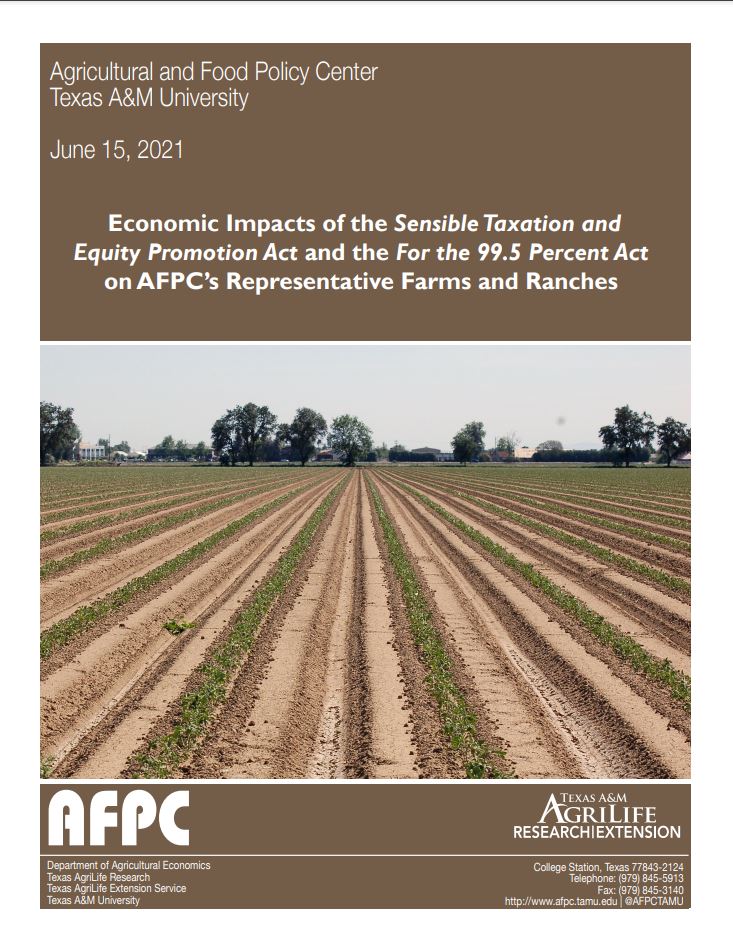The Agricultural and Food Policy Center at Texas A&M University recently released a report looking at the likely impacts of proposed changes to the estate and capital gains taxes. [View Report here.] Specifically, the report analyzed the impact that changes to the lifetime exclusion for estate taxes and the elimination of the stepped up basis for capital gains taxes would have on the AFPC’s 94 representative farms. The results were clear in showing that for the representative farms, the proposed policy changes would greatly increase tax liability.
Estate Tax
Currently, the lifetime exemption for estate tax purposes is $11.7 million per person ($23.4 million for a couple). This means that for estates valued at less than this amount, no estate tax is due. To learn more about the estate tax, click here to read a prior blog post or click here to listen to a prior podcast episode.
The “For the 99.5 Percent Act (99.5% Act),” introduced by Senator Bernie Sanders, would make various changes, including decreasing the estate tax exemption to $3.5 million per person.
Capital Gains Tax
Capital gains taxes are due when a person sells an asset that appreciated in value since it was purchased. For example, if a person purchased land worth $500/acre and later sell it for $1,200/acre, capital gains taxes would be owed on the $700 increase in value. Current law allows for a step up in basis in certain situations, which may decrease the capital gains tax liability. For example, assume a person purchased land worth $500/acre. When that person died, the land was worth $900/acre and it was given to the person’s child in the will. In this situation, the stepped up basis would allow the cost basis to be changed from the $500 purchase price to the $900 value of the land when it was inherited by will. If the child then later sells the land for $1,200/acre, capital gains taxes would only be owed on the $300 increase. To learn more about capital gains taxes and the step up in basis, click here for a prior blog post and here for a prior podcast episode.
The “Sensible Taxation and Equity Promotion (STEP) Act”, which was introduced by Senator Chris Van Hollen, would eliminate the stepped up basis.
Results
The AFPC maintains a database of 94 representative farms located in 30 states around the country. These representative farms have been used for over 30 years in policy analysis. When the AFPC conducted simulations using these 94 farms to determine the impact of the STEP Act and the 99.5% Act on these farms. Specifically, AFPC looked at the impact on generational transfer under the STEP Act, under the 99.5% Act, and under both the STEP Act and the 99.5% Act. The complete results may be found in their report here.
A brief summary of the results shows that under current tax law, only 2 of the 94 representative farms would face estate or capital gains tax liability pursuant to a generational transfer. Under the 99.5% Act, 41 of the 92 representative farms would be impacted with average additional tax liability of $2.17 million per farm. Under the STEP Act, 92 of the 94 farms would be impacted, with an additional tax liability averaging $726,104 per farm. Finally, if both the STEP and 99.5% Act were implemented, 92 of the 94 representative farms would be impacted with additional tax liabilities of $1.43 million per farm.
Key Takeaways
First, all agricultural operations should have an estate and transition plan in place to ensure the success of the operation when transferred to the next generation. As part of this plan, potential tax liabilities should be considered and tools to help alleviate or minimize these liabilities should be utilized when necessary. Do not wait until the transition happens to formulate a plan!
Second, proposed tax law changes certainly have the potential to impact agricultural operations. All rural landowners and agricultural operations should keep a close eye on any changes and be prepared to make necessary changes to their estate and transition plans.
Finally, to hear more about these proposed changes and this report, check out my friend Paul Goeringer’s podcast later this week, where he will interview Dr. Bart Fischer.













